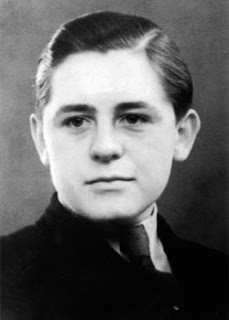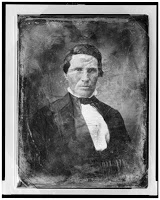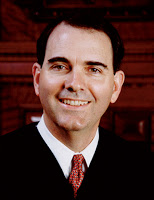Confronting the Latter-Day Reich: When Insubordination is a Moral Duty

This was a man: Helmuth Hubner was executed on October 27, 1942, at the age of 16, by the Hitler regime. His “crime” — for which he was excommunicated from the Mormon Church — was circulating anti-Reich leaflets with the help of two young friends.
One of the noblest moral examples I was taught as youngster was that of an insubordinate officer in the Missouri Militia.
Principled insubordination: Alexander William “Will” Doniphan, seen in this primitive portrait, refused to carry out the execution of a civilian convicted of being an “unlawful enemy combatant” by a military tribunal in Missouri.
Alexander William Doniphan served under Maj. Gen. Samuel D. Lucas during Missouri’s “Mormon War” of 1838. The conflict was a grace note (perhaps “graceless” note would be a better description) to decades of bloodshed. (By the end of the War Between the States,” “Missouri” was a proverb alluding to the bestial violence of unrestricted guerrilla warfare.) The Missouri civil war grew out of an irreconcilable cultural dissonance between the Mormon settlers – who arrived in Jackson County in 1831 and announced that God had given them the land to build “Zion” — and the state’s established settlers.
(The most comprehensive, even-handed, and nuanced treatment of this conflict, in my view, is Stephen LeSeur’s book The 1838 Mormon War in Missouri.)
By 1838, following numerous incidents of mob violence and persecution, some Mormon leaders organized a covert force commonly called the “Danites,” an oath-bound proto-terrorist group intended to plunder the church’s enemies and intimidate its internal dissenters. This followed a July 4 oration (.pdf) by Sidney Rigdon, the Mormon Church’s second-in-command, in which he spoke of a “war of extermination” between the Mormons and their enemies (including internal dissenters).
Over the next several months the conflict waxed bloody, with the Mormons getting the worst of it — particularly in the abominable mass murder committed at Haun’s Mill. That atrocity followed the Mormon attack on Missouri militiamen at Crooked River, which prompted Governor Lilburn Boggs to issue an executive order designating the Mormon population en toto as (in effect) unlawful enemy combatants to be “exterminated or driven from the state.”
After the massacre at Haun’s Mill, which demonstrated that literal extermination of the Mormons was an acute possibility, Mormon Prophet Joseph Smith and his top associates were forced to surrender to the state militia at the town of Far West. They were arrested, run through a burlesque of a trial under Maj. Gen Gen. Lucas, and sentenced to be shot at dawn.
Lucas issued a written order to Colonel Doniphan commanding him to carry out the execution:
“Sir: You will take Joseph Smith and the other prisoners into the public square at Far West, and shoot them at 9 o’clock tomorrow morning.”
Doniphan, to his eternal credit, refused the order and more or less gave Lucas anatomically explicit instructions regarding its proper disposal.
“It is cold-blooded murder,” Doniphan wrote to Lucas. “I will not obey your order. My brigade shall march for Liberty [Missouri] tomorrow morning, at 8 o’clock; and if you execute these men, I will hold you responsible before an earthly tribunal, so help me God!”
Consider how this situation – additional relevant details of which I’ll share – appears today, in the sixth year of an open-ended “war on terrorism”:
Joseph Smith, as the civilian leader of an armed insurgency, had been arrested and tried by a military commission in the midst of a literal war. His closest aide had threatened to “exterminate” those who didn’t belong to his sect; his movement included an oath-bound, violent secret society, some members of which had killed state militiamen. And defectors from Smith’s movement had testified, under oath, that Smith had promised “he would yet tread down his enemies, and walk over their dead bodies; and if he was not let alone, he would be a second Mohammed to this generation, and that he would make it one gore of blood from the Rocky mountains to the Atlantic ocean; that, like Mohammed, [his] motto in treating for peace was `the [Koran] or the Sword.’”
Alexander Doniphan, by contemporary conservative sensibilities, would have to be considered a traitor for insisting that the sectarian extremist named Joseph Smith was entitled to due process of law, rather than being summarily executed after a perfunctory trial before a military commission.
As a youngster raised in a Mormon home, I was taught to revere Doniphan as a man of principle – not just because he had saved Joseph Smith’s life (or at least deferred his death for nearly six years), but because he defended the rule of law at considerable risk to himself. I hold that view now as an adult who has left Mormonism and – much more importantly – come to trust in Jesus Christ alone for salvation.
My opinion of Doniphan has been shared by others outside the Mormon faith, among them the producers of the television serial based on Profiles in Courage, adapted from the book of the same title ghost-written for John F. Kennedy by Theodore Sorenson.
I have no reason to doubt that Doniphan’s story was well known to Jay Bybee, Timothy C. Flanigan, and Kyle Sampson – all of whom are Mormon attorneys who served in key positions under George W. Bush, and all of whom played critical roles in the creation of a Leader State in which the rule of law is subordinate to the will of The Decider.
Jay Bybee, as I’ve pointed out elsewhere, signed the notorious 2002 torture brief commonly called the “Yoo Memorandum” after its chief author, John C. Yoo – proponent of totalitarian presidential power and defender of the president’s supposed right to order the sexual mutilation of innocent children ( children as innocent as those murdered and mutilated at Haun’s Mill, Mr. Bybee). After putting his imprimatur on a memo claiming broad discretionary power on the part of the president, and his designated agents, to commit acts of torture and even homicide, Bybee was rewarded with a post as a federal appellate judge.
Timothy E. Flanigan, who served both Bushes, was one of the Republican litigators deployed to Florida just hours after the Bush-Gore deadlock was announced in November 2000. Appointed as a deputy to Alberto Gonzalez when the latter was Chief White House Counsel, Flanigan was reportedly the first to propose the creation of “military commissions” for accused terrorists (military commissions like the one that ordered Joseph Smith’s execution, Mr. Flanigan).
“Military commissions, [Flanigan] thought, would give the government wide latitude to hold, interrogate, and prosecute the sort of suspects who might be silenced by lawyers in criminal courts,” reported the New York Times on October 24, 2004. More importantly: “[The commissions] would put the control over prosecutions squarely in the hands of the president. To act pre-emptively against al-Qaeda, the authorities would need information that defense lawyers and due-process rules would discourage suspects from giving up. Flanigan framed the choice starkly: `Are we going to go with a system that is really guaranteed to prevent us from getting information in every case or are we going to go another route?’”
In defiance of his oath to uphold the Constitution – which, as a Mormon, he was taught was a divinely inspired document – Flanigan helped the Bush regime find “another route,” albeit one well-trod by its predecessors in Moscow, Baghdad, and Berlin.
(Flanigan, incidentally, would likely be Alberto Gonzalez’s deputy AG today were it not for his connections to Jack Abramoff.)
A bespectacled young man of unexceptional stature, Kyle Sampson is saddled with an ironic surname. But his unprepossessing appearance belies his ambition and cynicism he revealed by facilitating the White House scheme to purge from the ranks of federal prosecutors those US Attorneys deemed inadequately loyal to The Decider and insufficiently submissive to his will. This plan would exploit a provision in the updated version of the so-called Patriot Act permitting the Attorney General to replace US Attorneys without Senate approval.
Prior to his resignation two days ago, Sampson was chief of staff for Attorney General Alberto Gonzalez. Last December 7, as recently revealed e-mails document, Sampson composed a “Plan for Replacing Certain United States Attorneys,” which instructed Justice Department officials in how to evaluate prosecutors and how to justify the firing of those deemed unsatisfactory.
The criteria outlined by Sampson (or by Bush and Gonzalez by way of Sampson) included a positive answer to the question of whether a given prosecutor had “exhibited loyalty to the president and attorney general.” That “loyalty,” it is now clear, would be displayed by using prosecutorial power in the service of Republican partisan interests by pursuing politically useful investigations of Democratic politicians (or by refraining from pursuing Republicans – the supposed offense that led to the termination of Carol C. Lam).
In a section entitled “Prepare to Withstand Political Upheaval,” Sampson provided talking points to placate elected representatives and others who would be angered by the summary and unjust termination of the federal prosecutors.
As Paul Craig Roberts and others have pointed out, federal prosecutors have become a besetting plague to our nation. Had the Bush White House implemented its original plan and fired the entire lot of them, our nation would be better off – provided that they were not replaced. But the objective was to make the entire prosecutor corp an instrument of The Decider’s will and a partisan asset of the Republican Party – and Sampson eagerly abetted that criminal undertaking.
Bybee, Flanigan, and Sampson each had opportunities to emulate Alexander Doniphan’s admirable example: They could have refused to participate in the Bush Regime’s assault on the rule of law, due process, and separation of powers; they could have acted as whistleblowers; they should have been true to their constitutional oath.
Because the leader they served was destroying the rule of law, insubordination was a moral duty. Instead, they consecrated their time and talents to the building up of the Leader State and the establishment of a latter-day Reich.
Be sure to visit The Right Source for news, opinion, and talk radio from a freedom-centered perspective.
Content retrieved from: http://freedominourtime.blogspot.com/2007/03/confronting-latter-day-reich-when.html.







